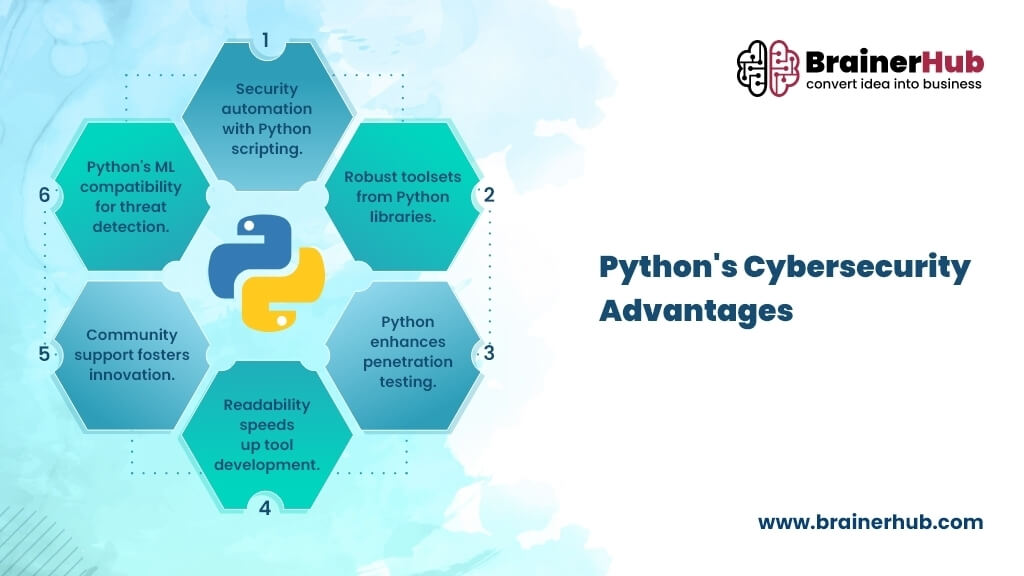To begin with, programming knowledge is important in the field of cybersecurity, and Python is a popular option because of its remarkable adaptability. Further, cybersecurity protects digital systems from harmful attacks across varying platforms such as networks, mobile devices, and the cloud. While developing new products, services, or applications there comes a point where security gets neglected and can have a negative effect on the businesses in the process. Cybersecurity will help to prevent breaches and unwanted access to your applications. Let’s delve into the reasons why Python is reliable for cybersecurity.
Why Python is a Good Choice for Cybersecurity: Key Essential Points
- Security automation is powered by flexible scripting.
- Robust toolsets are enabled by top-notch Python libraries.
- Python increases the effectiveness of penetration testing.
- Readability promotes the rapid development of security tools.
- Support from the community encourages ongoing innovation.
- Python’s compatibility with machine learning helps to detect potential threats.
Python is a well-known and flexible programming language that is quickly leading the way in security department. Businesses advance their security transformation with Python by automating tasks like vulnerability assessments, network scanning, penetration testing, and more. In this manner, businesses will have the opportunity to stay ahead with their security procedures. Moreover, Python developers can assist you with tailored solutions to build cybersecurity that will safeguard your data and protect from potential dangers.
Next, let’s discuss in detail how Python can be used for Cybersecurity.
What are the Uses of Python in Cybersecurity?
There are multiple uses of Python in cybersecurity that will improve and maintain business data privacy.
Identify the Security Threats
Firstly, it is important to identify and detect the entry point of threats or attacks that are hampering security. The role of Python here is to analyze, filter, and interpret log files through its powerful coding as well as robust libraries. With the help of Python, businesses can quickly identify unauthorized access and questionable activity by examining the log files.
Eliminate Security Gaps
One of the major benefits of using Python in cybersecurity is conducting penetration testing to evaluate cyberattacks and provide solutions through the best libraries while reducing the chances of error. Further, Python can also conduct standard app testing to find potential issues and vulnerabilities that can hinder the app’s operations.

Malware Assessment
It’s a well-known fact that Python has many useful features that can assist with conducting malware analysis. This programming language has the ability to write scripts automate dynamic assessment and offer insights. Python is one of the best options for behavioral pattern identification, memory forensics, and network traffic analysis that will help to create a thorough picture of the cyberattack. By making it easier to recognize changing patterns, Python’s compatibility with machine learning improves overall analysis.
Automating Security Measures
Python can make the security automation process simple and quick so businesses could benefit from it. Further, this will strengthen security measures and boost overall productivity. All of these scripts may be set to run automatically on a schedule, saving you time and effort.
Password Cracking
For password cracking, the Python program can be used to identify weak passwords and password regulations better to increase security. Further, Python scripts can be used to test system security by conducting controlled brute-force attacks, auditing passwords, and determining password strength. It is ideal for authentication system testing and strengthening.
Web Application Security
Web application frameworks based on Python, such as Django and Flask, are utilized in the development of safe web applications that address vulnerabilities. Python scripts can be used to evaluate and validate web application security using vulnerability scanning and fuzzing. To safeguard data in transit, one can also use HTTP.
Digital Forensics
Python analyses digital evidence, such as file carving, information extraction, and data recovery, to assist with digital forensics. Its capacity to handle and examine a wide range of data types makes it an invaluable instrument in digital forensics investigations, helping to locate proof and gauge the extent of cyberattacks. With Python in cybersecurity, digital forensics could also be used for pattern recognition, artifact recovery, and more efficient evidence evaluation.
The Debugging Process
For the debugging process, Python’s syntax and English syntax are comparable. It facilitates problem-solving and makes code reading easier. This facilitates the debugging and error-finding procedure for the code. The integrated Python debugger is a useful tool that makes it simple for you to debug your code. Cybersecurity professionals can easily debug the process by using Python.
Let’s discuss exceptional libraries of Python for cybersecurity and how they play impactful roles while improving overall business safety.

Top-Notch Libraries of Python for Cybersecurity
Here are Python libraries that help cybersecurity and boost overall business productivity.
1. Scapy
A flexible library for manipulating packets that can be used to create and decode network packets. It is used for penetration testing, network analysis, and testing.
2. Requests
This module makes sending HTTP requests easier, which makes it perfect for data extraction, APL analysis, and web application security testing.
3. Nmap
Businesses and penetration testers can use this to get rid of security flaws in the applications. Python module helps to automate varying security testing tasks such as network scanning, host discovery, and vulnerability analysis.
4. PyShark
One of the most popular Python libraries is PyShark that enables companies to utilize this module for cybersecurity. Expert programmers can see and analyze network packets using its Python support, making it an invaluable tool for cybersecurity experts and businesses.
5. YARA
An open-source tool for recognizing and categorizing malware is called Yara. It allows the user to specify criteria for file and network traffic matching. The tool makes use of the Yara-Python module to detect malware and incident response capabilities.
6. Scikit-Learn
A Python machine-learning framework called Scikit-learn allows companies to concentrate on data mining and analysis. For cybersecurity, this library is used for identifying threats, breaches, and categorizing malware.
7. Matplotlib
Businesses can use the Matplotlib library to produce Python data visualizations. To identify patterns, trends, and irregularities in data, the Matplotlib package visualizes log files, network traffic, and other types of data. It enables companies to identify risks, examine them, and generate reports.
8. Cryptography
The Cryptography library can help to secure clear communications and safeguard data. With the help of these libraries, you may encrypt files or processes and perform a wider range of cryptographic operations.
Above mentioned are few trusted Python libraries that will help to improve cybersecurity and protect the data privacy of your business.

What are the Advantages of Using Python for Cybersecurity?
There is no denying, to the fact that Python is the most adaptable and flexible programming language with numerous cybersecurity benefits. Let directly dive into it.
- Python is easy to understand and use, hence developers can learn the programming language as it does not have lengthy codes.
- Further, Python is an open-source programming language, so developers can get the necessary knowledge and resources to resolve potential security threats.
- Python has exceptional libraries that assist with resolving security threat issues and boost websites or applications to perform better.
- Python is quite flexible for building complex and customized cybersecurity systems according to client’s requirements.
- Choosing Python for cybersecurity will provide high performance and scalability to analyze large amount of data.
- Python is quite compatible with machine learning to detect potential security threats and provide solutions to improve overall business operations.
- Python can also help with scalability when it comes to developing cybersecurity systems.
- For cybersecurity, Python scripts are created quite easily to assess vulnerabilities and provide solutions to improve business productivity.
Final Thoughts on Choosing Python for Cybersecurity:
Python has emerged as a programming language that can do almost everything in cybersecurity. Its versatility, simplicity, and a vast array of libraries make it indispensable in securing digital environments. From penetration testing to malware analysis, Python offers solutions across the entire cybersecurity spectrum.
In conclusion, Python’s ability to automate tasks, parse data, and integrate with existing systems streamlines processes and enhances efficiency. Moreover, the active community continually develops new libraries and tools, ensuring Python remains at the forefront of cybersecurity innovation. Python empowers cybersecurity experts to adapt rapidly to emerging challenges, keeping them ahead of time without compromising on any operational level.
Want to incorporate Python into Your Cybersecurity systems?
Our company can assist you with Python Development Services for cybersecurity and protect data from potential threats. Contact BrainerHub Solutions now to learn more!
FAQs
There are numerous cybersecurity tasks such as malware detection, network traffic analysis, and vulnerability assessments, can be automated with Python. Additionally, it can be utilized to create unique security solutions for certain purposes.
Python has been among the popular programming language with both developers and businesses. As the language is highly adaptable it can build complex and customized cybersecurity systems depending on the client’s needs making it the ideal choice.
Yes, Python can help you with securing your web applications with its advanced features and robust libraries. If you are looking for a top-notch Python development company in India, simply contact us today to learn more about our services.

